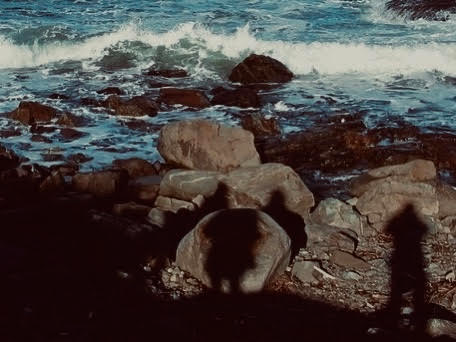The terror of the unforeseen – summer, 2019
I am in the passenger seat; my wife is driving at her usual steady pace, heading north on I-91, just outside White River Junction, Vermont. It’s a beautiful late summer morning, the sun is shining, and there is hardly any traffic on the road. As we’re cruising along, I’m thinking about how to start a paper on Shakespeare’s Richard II, which I will be presenting at a conference in Philadelphia the following April. Writing about Shakespeare is fun for me. The scholars who read my books appreciate what I have to say, and sometimes they assign my essays to their graduate students. So when the invitation to contribute something to this conference came up, I was happy to accept. I’m pleasantly daydreaming about discussing the play with colleagues I admire and maybe getting together with an old friend I haven’t seen in years.
Something doesn’t sound right. As I glance over, I see an eighteen-wheeler, so close I can read the fine print on the door: Timber Transport. In that same instant I hear the sickening crunch of an impact. We swerve counter-clockwise and the full weight of the speeding truck slams into the driver’s side, shattering the window. Our car is pushed sideways at high speed for the next half mile. The screech of the tires being ripped off the wheels is deafening. There is no way to steer the car out of trouble or moderate our speed; the two of us are trapped and absolutely helpless. During the 30 or 40 seconds it takes before the truck stops, my only thought is how this will ruin my plans for the weekend.
What follows is a scene we have witnessed many times before, but this time we are not witnesses; we are the scene. Traffic slows down in both directions to have a look. Two men who saw the accident are running up the side of the road. Their t-shirts both say Geek Squad. One of them is on the phone, but the only word I can hear is “elderly.” The other one asks, “Is your wife all right?” And right here is the scar, the focus of the trauma. Did I act quickly enough to get her out of there? She’s climbing over the gearshift lever; broken glass is all over the front seat. There’s blood on her arm. I still have no idea how the accident happened that day, or why our lives were spared.
The first vehicle to arrive at the scene is the fire chief’s car from Norwich, Vermont. He’s kind, concerned about our well-being, and then he tells us he sees a lot of accidents like this. There’s a college nearby and most of the time, people are not so lucky. A few minutes later, two paramedics show up in their van. Their names are Josh, who spends a lot of time in the weight room by the look of him, and Jeremy, the nurturing one. They take our blood pressure and give my wife a Band-Aid for the small laceration on her arm, probably caused by a piece of flying glass. After a few minutes they realize we really are ok, vital signs normal and no sign of any injury. Josh says, “This is a win for us.” I don’t take time to think about what a loss would have looked like.
A few hours later I drive back home over the A-10 in a rented SUV. It’s tense; we don’t talk much. For the next month we’re sitting at home in Montréal without a car. Our street and our front yards have been dug up so that contractors working for the city can replace the old lead pipes that supply our fresh running water with copper tubing. Heat, dust, noise and uncertainty occupy our waking hours. I sleep a lot, and sometimes I wonder if I will ever feel safe in a car again. I have recurring morbid thoughts, sudden episodes of disorientation, constant fatigue, and hours of inexplicable sadness. During this time, I went out of my way to describe the events of that day to everybody I met. The story I told everybody was about resilience and poise and grace under pressure and how it might have been the car’s low centre of gravity that saved our lives. The details were all accurate; the whole narrative was an evasion of the truth. If I showed you the picture I took at the crash site, the side of the car doesn’t look that bad. The crushed and shredded panels on the driver’s side where my wife was sitting don’t show.
Unborn sorrow – winter, 2019 / 2020
Things didn’t really settle down until early November. By then we had a brand-new car paid for by insurance, with digital enhancements I still do not understand. I wasn’t that confident about driving, but managed to get back and forth to the gym and the library without much difficulty. Construction work on the street was finished. The State’s Attorney of Windsor County, Vermont, wrote to advise us that the driver of the truck signed a plea agreement to serve two years’ probation for negligent operation of a vehicle. I thought the sound of the first impact was fading away and I was ready to get my life back to normal. And for me, back to normal meant starting work on Richard II, even though the conference was still a good six months away. Things do not go according to plan.
Shakespeare’s play tells the story of King Richard’s overthrow and murder by his cousin Henry Bolingbroke, later King Henry IV. Richard is the central character in the drama; his suffering and death are the source of its greatest poetry. When I suggested to a friend that Richard is the role I would really like to perform, his response was, “Yes, but don’t we all think Bolingbroke will be a better king?” Despite the absurdity of the idea I was a little offended, so I replied by quoting Richard to show him how great the King’s speeches are.
For God’s sake, let us sit upon the ground
And tell sad stories of the death of kings;
How some have been deposed; some slain in war,
Some haunted by the ghosts they have deposed;
Some poison’d by their wives: some sleeping kill’d;
All murder’d: for within the hollow crown
That rounds the mortal temples of a king
Keeps Death his court […] 2.3.155-163
What was it about a hollow crown where death keeps his court that stuck in my mind, and for that matter, why would I want to play the part of the sad, defeated king?
The suggestion that Bolingbroke would be a better king is a standard line of interpretation in Shakespeare scholarship. It appealed to me when I first heard lectures on the play in college. Dwight Eisenhower was President of the United States then, and we were beginning to hear great things about the junior senator from Massachusetts who was already campaigning for that office. A few years later Jack Kennedy gave the commencement speech at my graduation. It seemed the hope for a better king was about to be realized. Eighteen months later he was shot to death by Lee Harvey Oswald.
Many people look for a better king in Richard II, but others are more deeply moved by the passion and death of the sad king. In La Leçon de Rosalinde, Mustapha Fahmi has this to say about King Richard: “Selon lui, il n’y a pas de bon ou de mauvais leader. Il y a seulement des rois légitimes et des usurpateurs.” Fahmi’s point here is that the idea of “a better king” is simply not a meaningful expression. You don’t get to be king by doing something; it’s not something you deserve or achieve by your actions, and you are not answerable to anybody else. Richard gets to be king by being born to the right parents, and nothing further can be said. At the beginning of the play Richard says, “I was not born to sue, but to command.” You and I might find this sentiment odious – my students absolutely hated him – but in the story, Richard is the only character who can truthfully say this. If we’re offended by the idea, it might help to realize that what he is articulating here is a claim to self-sufficiency. And maybe that’s why the crazy idea I had of playing the King was attractive, even though I know he comes to grief in the end.
Richard II is a grief-stricken play. Grief is mentioned dozens of times, along with sorrow, weeping, tears, mourning and lament. Everybody comes to grief sooner or later. Grief is a complex word. It comes from old French grever, to bear a burden, which derives in turn from Latin gravis, heavy. It has links with grave and gravity and also Latin gravitas, which we use for ideas of dignity and seriousness. Shakespeare’s play is like a dictionary of grief, using the word to express harm, injury, pain, hardship, frustration, along with more familiar notions of loss and emotional distress. It also has the derivative sense of grievance, a sense of bitterness felt by a person of mediocre talents towards someone perceived as undeserving of their privilege. All this sadness is not a good fit with a political success story. Instead of cheering for Bolingbroke, maybe we’re supposed to be weeping for the overthrow and death of Richard.
I saw the beauty of the sad king for the first time in a performance of Richard II at The Stratford Festival, directed by Martha Henry, in 1999. The actor who played Richard was literally head and shoulders above every other man in the cast. But it was the performance of the young Queen Isabel that showed me what I had missed about Richard. The role of the Queen was played by a sixteen-year-old woman named Maggie Blake. It’s a small part, with just over 100 lines, yet she was the emotional centre of the play, not only in the passion she brought to the poetry but even more in the sensuality of her presence.
In Shakespeare’s plays, women often experience grief with concrete, sensuous immediacy. The beauty of the sad king becomes visible for us in the eyes of the Queen. She has just learned that her husband has been defeated in a critical battle and she may never see him again. Confronted with the finality of a death foretold, the young queen turns her mind to the shared passion of their intimate life together. This is where grief takes up residence.
Queen: . . . I know no cause
Why I should welcome such a guest as grief,
Save bidding farewell to so sweet a guest
As my sweet Richard: yet again, methinks,
Some unborn sorrow, ripe in fortune’s womb,
Is coming towards me, and my inward soul
With nothing trembles: at something it grieves,
More than with parting from my lord the king. 2.2.5-13
Maggie Blake’s performance showed us that the Queen knows what is beautiful about him. And what she knows about him invites us to love the sad king ourselves. The unborn sorrow, ripe in fortune’s womb, could be a child Bolingbroke cannot afford to let her bear. But in a larger sense, her unborn sorrow is foreboding about the unanticipated and the uncontrolled, reminding us that our existential condition does not allow space for self-sufficiency. They say there’s no escape from the past, but the Queen understands there’s no escape from the future either. No consideration will be given for their love.
Shakespeare’s historical plays are populated by men who cannot hear the voices of women, choosing instead to seek esteem and validation from other men. More often than not they come to grief, generally after inflicting considerable damage on the lives of other people. Bolingbroke is surrounded by men like this. In Martha Henry’s production, these men
were all heavy-bodied, all about the same height, similarly dressed in military gear, and when they would crowd together on the stage, it was sometimes hard to tell which one was Bolingbroke. The idea that he would make a better king disappeared in the gray banality of their ambition.
What then is the larger shape of this play? Is it a story of the triumph of a better king, or have we been witnessing a scapegoating ritual? Antonin Artaud might stage this play as theatre of cruelty:
“il ne s’agit pas de cette cruauté que nous pouvons exercer les uns contre les autres en nous dépeçant mutuellement les corps, en sciant nos anatomies personnelles . . . mais de celle beaucoup plus terrible et nécessaire que les choses peuvent exercer contre nous. Nous ne sommes pas libres. Et le ciel peut encore nous tomber sur la tête. Et le théâtre est fait pour nous apprendre d’abord cela.”
One last question then: What does it say about us that we resist the grief expressed in this play, displacing it into wishful thinking about a better king?
The weight of this sad time – spring, 2020
In the middle of February, one of the panelists for my session at the Shakespeare conference was in a car accident and suffered multiple injuries, which required emergency surgery. This was followed by three weeks of rehabilitation in a local hospital. Her husband advised me she would not be able to travel to Philadelphia in April.
A few weeks later, the conference was cancelled in response to the spread of SAR-CoV-2. About this time, Mustapha Fahmi was hospitalized with a severe case of COVID 19. He now writes to say he has been declared “healed” by public health. The worst is over, but he still faces a lengthy recovery. His wife and his two sons were also infected but did not require hospitalization.
On Friday, March 13, I celebrated my eightieth birthday with a group of close friends. As planned, we spent our time discussing Richard II. We dispensed with our customary hugs of greeting. In hindsight I wonder if we were taking a greater risk than we realized. The next day I learned that my cousin Ted had passed away.
Teddy was a little boy when I was already married, with two children, getting started with my career. I never knew Ted as a man; he was not part of my adult life and I can’t say we were close friends. And yet I wept, surprised by the tears. I remember the day I showed him how to throw a baseball. It was a beautiful late summer morning, the sun was shining, and he wasn’t too sure about the baseball, which was pretty big for his four-year-old hand. He trusted me to show him how, and then he tried it himself. After a few attempts he got it and he laughed the way kids do when they accomplish something new for the first time.
I have an old picture of the twelve cousins, taken when the oldest of us were teenagers. If I showed you the picture, you would see an image of happy family life. We’re all smiling at our beloved uncle from Texas, standing just to the right of the camera, getting us to laugh. Teddy is standing between his big sister Veronica and his little brother Benjy. The picture doesn’t show everything. You can’t see the unpleasant racist jokes the beloved uncle from Texas has been telling all afternoon about the Latino citizens of Corpus Christi. You can’t see the legacy of alcoholism that’s going to destroy the life of the pretty fourteen-year-old girl over there on the far left. You can’t see how Teddy’s parents are struggling to pay the bills and keep food on the table. And you simply cannot imagine the fabulous wealth Teddy and Ben and Veronica are going to acquire in their adult life or how generous they will be in sharing it. All those things happened. But those things are only part of the story. Better to contemplate the simple joy of a happy childhood because that’s just as real as anything else I could tell you about.
My sister says, “You have to grieve; you need to grieve. Otherwise there is something crucial and unfinished in your life.” I think a lot of people would agree with her. For me it’s not the whole story. We’re never self-contained; we’re always incomplete. There are things that come from outside us that are essential to the self, like the language we speak, the things we learn and the stories we read. In that way we have never been self-sufficient. Everything you or I do is surrounded and shaped by things that are not you or me, an eighteen-wheeler that comes out of nowhere, destroys the car and almost ends my life. My story is a mingled yarn, just like yours; this one is made out of personal memories braided together with strands from Shakespeare’s poetry, my sister’s email and letters from my editor.
Grief is not so much a task to be completed; it’s a burden you carry all the time for the value of everything that’s been lost, for sins of omissions, missed chances, and roads not taken. In that way grief is feeling the accumulated weight of all our losses and disappointments and all our regrets. It exists in our souls to challenge any vain hopes for self-determination. Grief compels us to understand what really matters, over against the irresistible power of contingency in our lives. And by acknowledging the cruelty of what the world can do to us, we are at the beginning of resistance to the unnecessary cruelty we habitually inflict on one another.














